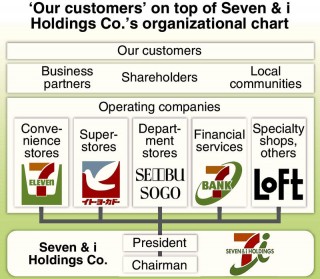Loading
Search
▼ Suzuki’s Kingdom / Hands-on Leaader Helped Seven-Eleven Japan Leap Forward
- Category:Other
The Yomiuri Shimbun
This is the fifth installment of a series.
“Annual sales of Seven Premium-brand products surpassed ¥1 trillion for the first time,” Ryuichi Isaka, president of Seven-Eleven Japan Co., proudly declared on March 30.
Isaka, 58, was speaking at a spring event to exhibit the convenience store chain’s products held at Tokyo Big Sight in Koto Ward, Tokyo. Managers of 7-Eleven stores in Tokyo gathered at the event.
Seven Premium is a house brand the convenience store developed with makers. It consists of about 3,300 products, including prepared foods, bread, instant noodles and confections.
Since the brand was launched in May 2007, Seven-Eleven has demonstrated its sense of luxury through the ingredients and flavors of the products — and attracted consumers with the products’ quality, even though the typical selling point of house brands is their low price.
Toshifumi Suzuki, the 83-year-old chairman of Seven & i Holdings Co., was the driving force behind the project. An executive of Seven & i cannot forget one scene from August 2013. Suzuki, after arriving at the office, ordered the immediate disposal of packaged instant noodles, saying: “This quality can’t be tolerated. Remove them from the stores.”
About 1 million packs had already been produced, but the company recalled them, including those already on store shelves.
Suzuki’s management philosophy is to thoroughly see things from the same viewpoint as customers. He has tasted as many new food products as possible, and if he was not satisfied, he immediately ordered redevelopment. Kin no Shokupan, Seven-Eleven’s trademarked bread products, became a big hit, with 15 million units sold in four months after their release. But on the day of the release, Suzuki ordered to further improve the quality of the bread, saying, “The more delicious the products are, [the more of them customers will eat and] the sooner they will get tired of them.”
Suzuki moved into the convenience store business from a publication distributor, and thus had little experience in customer service and product procurement.
But this has been Suzuki’s advantage. An executive of Seven & i said that Suzuki’s way of doing business is characterized by “product development and arrangement of stores without being stuck in past experiences.”
Suzuki’s business styles have been viewed as models by rival companies.
In February, Lawson Inc. completed the introduction of a new product-ordering system in most of its chain stores nationwide.
The system gathers the purchase records of customers’ point cards, and the chain’s headquarters uses them to decide on the numbers of products to be ordered, and which are deemed to be appropriate after considering various factors including the following day’s weather. The headquarters then proposes the numbers to its stores.
The system is modeled after Suzuki’s “tanpin kanri” item-by-item management method.
Lawson President Genichi Tamatsuka, 53, said: “A smaller number of our customers buy four, five or more products [in a single visit]. This makes our chain lag behind Seven-Eleven.”
7-Eleven stores seamlessly stock their shelves with products that customers feel like buying. Rival companies can’t help but admit that Suzuki’s style, which thoroughly prioritizes the interests of customers, is advantageous.
Suzuki has played a leading role in Japan’s convenience store industry. However, while there are managers and owners of 7-Eleven stores who admire him, there are those who feel deep-rooted discontent.
One source of negative feelings is a business tactic dubbed the “dominant strategy,” in which many 7-Eleven stores have opened in concentrated locations in specific areas.
Though this strategy can make distribution of products to stores highly efficient and enable the Seven-Eleven brand to take root in local communities, it is not rare that there are two or more 7-Eleven stores in a radius of only hundreds of meters.
A man in his 50s who runs a 7-Eleven franchise store in the Kansai region complained: “Since another store opened near mine, daily sales have fallen nearly 30 percent. A 7-Eleven store’s rivals are other 7-Eleven stores.”
Operating a business with the brand recognition of Seven-Eleven, and with a high-level product lineup, can attract more customers than rival convenience store chains.
On the other hand, franchise store loyalty payment amounts are higher than those of other chains. The system is “more favorable for the headquarters than for the franchisees,” an executive of Seven & i said.
Some owners of franchise stores lament the system. One of them, who runs a store in the Tokyo metropolitan area, said, “It’s hard for me to build an asset.”
With his excellent foresight and extremely precise sense for the importance of data, Suzuki turned the Seven-Eleven chain into a huge group with over 18,000 stores across the nation. Now that Suzuki will retire from the front line of management, various assessments of him are being voiced.
- May 9, 2016
- Comment (0)
- Trackback(0)


